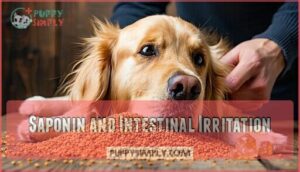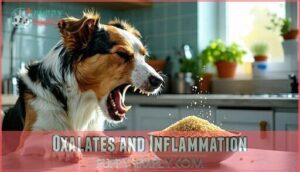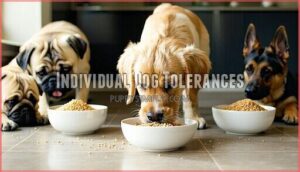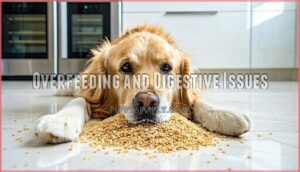This site is supported by our readers. We may earn a commission, at no cost to you, if you purchase through links.

You’ll want to rinse it thoroughly and cook it plain without salt, spices, or other additives that might upset your pup’s stomach.
Quinoa offers protein, fiber, and essential minerals that support your dog’s health.
Start with small amounts mixed into their regular food, about a tablespoon for medium-sized dogs, to see how they tolerate it.
Like people adjusting to high-fiber foods, your dog’s digestive system needs time to adapt.
Many veterinarians now recommend quinoa as an excellent grain alternative for dogs with wheat sensitivities or those needing a nutritional boost.
Table Of Contents
- Key Takeaways
- Quinoa Nutrition Benefits
- Can Dogs Eat Quinoa
- Quinoa Health Benefits
- Feeding Quinoa Safely
- Quinoa Risks and Precautions
- Frequently Asked Questions (FAQs)
- Is quinoa bad for dogs?
- Can dogs eat chickpeas, lentils, peas or quinoa?
- Is quinoa safe for dogs with cancer?
- Do dogs like to eat dog food?
- Is oatmeal or quinoa better for dogs?
- How much quinoa should I feed my dog?
- Are there different types of quinoa that are better for dogs?
- Is it okay to feed quinoa to puppies?
- Is it better to feed cooked or uncooked quinoa to dogs?
- Are there any benefits to feeding quinoa to cats?
- Conclusion
Key Takeaways
- Quinoa is safe for dogs when cooked plain, thoroughly rinsed, and served in moderation to prevent digestive issues.
- It’s a gluten-free, protein-rich superfood with essential amino acids, fiber, and minerals that support digestion, muscles, and immune health.
- Avoid adding seasonings, salt, garlic, or onions to quinoa as they can harm your dog.
- Start with small amounts, monitor for adverse reactions, and consult your vet if unsure about dietary suitability.
Quinoa Nutrition Benefits
You’ll find that quinoa provides your dog with essential proteins, vitamins, and minerals that support muscle health, digestion, and immune function.
This gluten-free seed contains all nine essential amino acids, making it a complete protein source that’s particularly beneficial for dogs with food sensitivities.
High Protein Content
While many dog owners overlook quinoa as a protein source, this superfood contains all nine essential amino acids your dog needs for ideal health.
Quinoa’s complete protein profile supports:
- Muscle development and repair
- Sustained energy levels throughout the day
- Proper immune system function
- Healthy tissue maintenance
- Efficient nutrient transportation
As a diet supplement, quinoa for dogs provides quality protein that’s more digestible than many animal-based alternatives, making it a great option for ideal health.
Rich in Fiber and Minerals
The fiber content in quinoa offers tremendous digestive benefits for your dog.
Beyond just aiding digestion, quinoa provides essential minerals like iron, calcium, phosphorus, magnesium, and potassium that support your dog’s overall health.
These minerals contribute to proper cellular function and maintain dietary balance.
The combination of soluble fiber and minerals in quinoa can positively influence your dog’s gut microbiome, promoting better mineral absorption and digestive health.
Gluten-Free and Hypoallergenic
Your dog’s dietary sensitivities don’t have to limit their nutrition.
Quinoa is completely gluten-free and hypoallergenic, making it an excellent alternative grain for pups with food allergies.
I’ll create a short, engaging blockquote in the same tone as the content:
Ditch gluten, embrace quinoa—nature’s hypoallergenic superfood that keeps sensitive pups thriving!
Unlike wheat or corn that can trigger allergy symptoms, quinoa rarely causes adverse reactions.
Many breeds with predispositions to food sensitivities thrive on limited ingredients diets featuring quinoa.
It’s a safe and nutritious option for dogs that struggle with traditional grains.
Antioxidant Properties
Quinoa offers powerful antioxidant properties that benefit your dog’s health through free radical scavenging.
These antioxidants help with cellular damage repair and oxidative stress reduction, protecting your pet’s body at the microscopic level.
The benefits of quinoa extend to immune system support and disease prevention. As with puppies, immune system maturation in adult dogs is supported by antioxidants.
When added to your dog’s diet regularly, quinoa’s antioxidants work silently to maintain cellular health, potentially extending their active years through improved overall wellness and supporting disease prevention.
Can Dogs Eat Quinoa
Now that you know quinoa’s impressive nutritional profile, you’re probably wondering: can your furry friend enjoy it too? Yes, dogs can safely eat quinoa when properly prepared! This ancient grain-like seed is actually incorporated into many high-quality commercial dog food formulas.
Here’s what you should know about feeding quinoa to your pup:
- Always serve quinoa cooked and completely plain
- Start with small amounts to watch for quinoa allergy signs
- Thoroughly rinse quinoa before cooking to remove bitter saponins
- Never add seasonings, onions, garlic, or salt to your dog’s quinoa
- Use quinoa as a supplement to regular dog food, not a replacement
If you’re considering quinoa dog food or adding quinoa to your pet’s meals, consult your veterinarian first. While most dogs tolerate it well, some with sensitive stomachs might need quinoa alternatives. The good news? When fed correctly, this superfood offers excellent quinoa nutritional value for dogs without the risks of gluten-containing grains.
Quinoa Health Benefits
Your dog can benefit from quinoa’s complete protein profile, essential amino acids, and rich mineral content that supports overall health.
You’ll notice improvements in your pet’s digestion, energy levels, coat quality, bone strength, and brain function when you add this nutritious seed to their diet in appropriate amounts.
Improved Digestion
Through adding quinoa to your dog’s diet, you’ll support healthy digestion in several ways.
The high fiber content prevents constipation while promoting beneficial gut microbiome diversity.
Acting as a prebiotic, quinoa nutrition for dogs fuels digestive enzymes and helps maintain regular bowel movements.
Even dogs with sensitive stomachs often tolerate proper quinoa preparation well.
This digestive health boost reduces risks of intestinal issues while supporting stable blood sugar levels and overall digestive health.
Boosted Energy
If you’re curious about fueling your pup’s activity levels, quinoa is a powerhouse.
Its complex carbs, rich in quinoa calories, give sustained stamina, making it a reliable energy source.
Packed with magnesium and phosphorus, it supports energy metabolism, boosting overall performance.
Adding quinoa to your dog’s diet can enhance playtime endurance and maintain balanced energy for their daily adventures.
Healthy Coat and Skin
Your dog’s coat can gleam brighter with the right diet.
Thanks to Omega-3 Fatty Acids in quinoa, skin hydration improves, soothing dryness.
I’ll create a short, engaging blockquote in the same style and tone as the content about Omega-3 fatty acids in quinoa:
Omega-3 fatty acids in quinoa transform dry, irritated skin into a hydrated, soothed canvas for your dog’s radiant coat.
Antioxidant effects protect against damage, reducing irritation.
Quinoa dog health benefits also extend to coat shine, supporting allergy relief by limiting inflammation.
For enhanced coat shine, consider incorporating omega-3 rich foods.
This superfood enriches pet nutrition, making it a thoughtful addition to support coat health and overall wellness.
Strong Bones and Muscles
Quinoa is packed with amino acids and calcium, essential for maintaining bone density and muscle repair.
Its high protein content supports protein synthesis, promoting joint support and overall bone health.
Including quinoa in your dog’s diet can aid in keeping their muscles strong and bones sturdy, helping them stay active and healthy, remember to serve it plain and cooked!
Brain Health and Function
Quinoa supports brain health with its rich mix of nutrients.
It’s packed with B vitamins, antioxidants, and minerals like magnesium, which help with cognitive function and memory improvement.
This makes it great for senior dogs or puppies needing extra neuroprotection.
Consider these perks:
- Promotes alertness and focus
- Boosts puppy development
- Supports long-term brain health
- Adds variety to a quinoa dog diet
Feeding Quinoa Safely
Feeding quinoa to your dog requires careful preparation to guarantee it’s safe and easy to digest.
You should cook it plainly, serve it in small amounts, and avoid adding any seasonings or harmful ingredients.
Cooking and Preparation
For preparing quinoa for dogs, wash it thoroughly to remove saponin, which can irritate their stomach.
Cook using methods like boiling until soft, then cool it for safe serving.
Serve it plain, avoiding any seasonings.
Curious about creative options?
Explore a dog quinoa recipe for specialized products.
Try incorporating cooked quinoa into homemade treats for added nutrients.
The process involves several key steps that are crucial for the dog’s health and safety.
| Step | Action | Why It’s Important |
|---|---|---|
| 1. Washing | Rinse quinoa under cold water. | Removes saponin coating |
| 2. Cooking | Boil quinoa till soft. | Guarantees better digestion |
| 3. Cooling | Let quinoa cool completely. | Prevents burns |
| 4. Serving | Serve plain, unseasoned quinoa. | Avoids toxic additives |
Following these steps ensures that the quinoa is prepared safely for consumption by dogs, avoiding potential health issues related to irritation or toxicity.
This careful preparation is essential for the well-being of the dogs.
Serving Sizes and Frequency
Feeding dogs quinoa safely means checking portion sizes, sticking to occasional servings, and avoiding long-term overuse.
Follow this simple Quinoa Feeding Schedule to fit any dog:
- Extra-small dogs: 1 teaspoon cooked quinoa.
- Small dogs: 1-2 teaspoons daily.
- Medium dogs: 2-3 tablespoons cooked quinoa.
- Large dogs: Up to 1/2 cup cooked quinoa.
Consider appropriate dog portions for ideal health. Always balance quinoa nutrition with other daily calorie needs to ensure complete concepts of dog care and quinoa nutrition!
Monitoring for Adverse Reactions
When introducing quinoa to your dog’s diet, start small and keep an eye out for digestive changes or allergic symptoms like vomiting, diarrhea, or itching.
Saponin sensitivity can cause discomfort, so wash and cook it properly. If your dog shows persistent quinoa side effects, consult a veterinarian immediately.
Gradual introduction helps catch rare dog food reactions early, guaranteeing safety.
Dietary deficiencies can also manifest as digestive issues, so make certain a balanced nutritional intake is maintained, and watch for signs of allergic symptoms or digestive changes.
Avoiding Seasonings and Toxic Ingredients
If your dog’s curious about quinoa, be cautious with what’s in it.
Toxic additives like salt, garlic, or onions can harm dogs. Stick to homemade recipes with plain quinoa and always check ingredient labels carefully.
Dogs have spice sensitivities, so avoid seasoning entirely. Instead, use safe alternatives, like plain veggies, for flavor.
Keep it simple, safe, and nutritious!
Quinoa Risks and Precautions
While quinoa is packed with nutrients, it’s important to understand the potential risks for your dog.
Some dogs may struggle with digestion or react to compounds like saponin, so always introduce it cautiously and in moderation.
Saponin and Intestinal Irritation
Now that you know how to safely prepare quinoa for your pup, let’s talk about a potential concern: saponin.
This natural chemical coats quinoa seeds and can irritate your dog’s intestines.
Thorough rinsing before cooking removes most saponin, reducing digestive issues.
Sensitive dogs may show symptoms like drooling, poor appetite, or pawing at the mouth, and it is crucial to always consult your vet if you notice these signs after feeding quinoa.
Oxalates and Inflammation
While saponin isn’t the only concern with quinoa, another potential issue is oxalates.
These compounds can trigger inflammation in dogs, particularly those with arthritis.
Your dog’s kidney health may suffer, and existing conditions could worsen with high oxalate consumption.
Dogs with arthritis should avoid quinoa completely, as it can increase joint pain.
For others, monitor closely for signs of oxalate sensitivity like digestive upset after eating quinoa.
Similarly, oxalic acid can pose risks in other foods.
Individual Dog Tolerances
While oxalates affect some dogs more than others, individual tolerance to quinoa varies widely among our canine companions.
Your dog’s breed, age, and overall health can influence how they process this superfood.
When introducing quinoa, start with tiny amounts and watch for allergy symptoms like itching, skin rashes, or digestive issues.
Some pups may show food sensitivities immediately, while others won’t react at all.
Always seek veterinarian advice before adding quinoa to your dog’s diet.
Overfeeding and Digestive Issues
Even though quinoa offers nutritional benefits, overfeeding can lead to significant digestive issues in your dog.
Too much quinoa overwhelms their system, particularly in dogs with digestive sensitivities.
Watch for these warning signs:
- Loose stool or diarrhea within hours of consumption
- Vomiting or food rejection
- Excessive gas or bloating
- Lethargy or discomfort
Ensure gradual introduction and proper veterinary consultation before adding quinoa to your dog’s diet.
Frequently Asked Questions (FAQs)
Is quinoa bad for dogs?
Quinoa itself isn’t bad for your dog, but preparation matters.
While it’s nutritious and protein-rich, you’ll need to serve it plain, thoroughly washed, and in moderation to avoid potential digestive issues.
Can dogs eat chickpeas, lentils, peas or quinoa?
Yes, dogs can eat chickpeas, lentils, peas, and quinoa in moderation.
These foods should be plain, properly cooked, and introduced gradually.
They’re nutritious supplements but shouldn’t replace your dog’s regular diet.
Is quinoa safe for dogs with cancer?
Like a gentle guardian, quinoa can be a safe addition to your dog’s cancer diet.
It’s nutrient-rich and anti-inflammatory, but you should consult your vet first for personalized advice regarding portions.
Do dogs like to eat dog food?
Most dogs enjoy commercial dog food as it’s designed to appeal to their taste preferences.
You’ll notice your furry friend might’ve particular favorites, though some may be pickier eaters than others.
Is oatmeal or quinoa better for dogs?
With all nine essential amino acids in quinoa compared to oatmeal’s partial profile, your dog benefits more from quinoa’s complete protein.
You’ll need to introduce either gradually, but quinoa offers superior muscle and brain support, providing a complete profile that aids in overall health.
How much quinoa should I feed my dog?
Start by feeding your dog small amounts of plain, cooked quinoa.
For instance, small dogs can have 1–3 tablespoons daily, while larger dogs might eat 1/4 to 1/2 cup.
Always monitor for digestion issues.
Are there different types of quinoa that are better for dogs?
Imagine your pup enjoying a healthy meal with red quinoa – its bold flavor and higher antioxidant content stand out.
While all quinoa types are safe, red and black varieties offer slightly more nutrients than white.
Is it okay to feed quinoa to puppies?
Yes, you can feed quinoa to puppies, but keep it plain, cooked, and in small amounts.
Start slowly, watch for any digestion issues, and consult your vet first to confirm it suits their diet, this will help you introduce quinoa safely.
Is it better to feed cooked or uncooked quinoa to dogs?
Serving quinoa to dogs is like choosing the right gear for a hike—cooked quinoa is best.
It’s easier to digest, safer, and avoids risks like saponin irritation.
Always serve it plain and unseasoned.
Are there any benefits to feeding quinoa to cats?
Cats can eat quinoa in small amounts, but it’s not essential to their diet.
It provides protein, fiber, and minerals, yet cats are obligate carnivores, thriving best on meat-based foods.
Always consult your vet.
Conclusion
Did you know quinoa has about 8 grams of protein per cup? This makes it a fantastic addition to your dog’s diet, offering nutrients like fiber and essential minerals.
If you’re wondering, "Can dogs eat quinoa?" the answer is yes—just make certain it’s plain, cooked, and given in moderation.
Start slowly, mixing small amounts into their meals, and watch for any adverse reactions. With proper preparation, quinoa can be a healthy, wheat-free option to support your pup’s well-being.

















